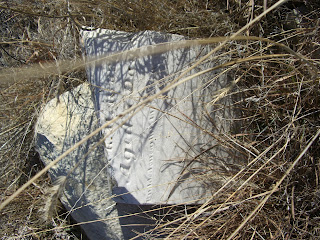 |
| Clark Beck, Byers, Class of 1954 |
In Isaac Werner's time there was no Byers, which came about a decade later. In Isaac's time the neighboring town just about a mile south of his homestead was Naron. Naron was never very big, but there was a general store, a school, a church, and some small businesses--possibly located in the homes of the few residents of Naron. On a hill outside of the town was a cemetery maintained by the Woodmen of the World, an organization about which I have written in a previous blog. The town of Naron is gone, but the cemetery remains, and occasionally there is still a burial.
What put an end to Naron was the railroad. When the tracks were laid about a mile south of Naron, the old town died and a new town by the railroad tracks was born. Many of the Naron businesses and residents simply moved to the new location, but the name did not go with them. Instead, the new town was christened Byers, named after the president of the Anthony and Northern Railway, O. P. Byers.
 |
| Byers 1st & 2nd Graders in 1950 |
Probably the first business built was the grain elevator on the east side of Main Street, as farmers were eager to have a place for selling and storing their crops, and with the train for shipping it seemed like a worthy business. The State Bank of Byers was promptly incorporated, and the post office opened for business on May 6, 1915. Plans for a new school building were quickly made, and the dedication of the school was held September 9, 1916. The town continued to grow and reached its population peak in 1924, with 227 residents.
By 1933 the Byers State Bank closed, and many families suffered. The railroad ceased operation in 1940. The demand from farmers for machine shops kept those going, in fact to the present day, and the school and a few businesses were surviving into the 1960s.
 |
| History of Byers, KS, Wilma Carr Beck |
I had married and my husband and I were in college, both of us with jobs that kept us from coming home very often. However, we were at the farm visiting my parents when my father suggested that we go into Byers for a little entertainment one evening. I could not imagine what he had in mind. My Aunt Wilma operated the post office in the little grocery store that had once been the bank, but she was closed in the evening, and about the only other business other than machine shops was Walt Fisk's barber shop. I was very surprised when my father pulled up in front of the local beer hall! I had never been inside that business and was shocked that it was our evening's destination.
My father bought the four of us our drinks--Cokes probably--and probably paid for our dominoes. Of course, we could have played dominoes at home, but he made a little adventure for us that night. Apparently, what I had known as "the beer hall" was being operated as a restaurant at that time, and we may have had hamburgers. I don't remember.
 |
| Byers, KS train depot and elevator |
Not long after our evening at the Byers Pool Hall, located under the Odd Fellows Lodge on the second floor, the east side of Byers Main Street burned. According to an old clipping on which someone has written "March 23, 1966," with the headline "Blaze Levels Byers Block," the fire began in the ceiling of Roberts Restaurant at 4:45, and the restaurant, the IOOF Hall above, Walt Fisk's barber shop, and the old city hall burned to the ground in a little over an hour.
The Volunteer Fire Department came from Iuka but could do little but put out grass fires started from sparks. Everyone counted the town lucky that when the blazing second floor collapsed on a propane tank below, the safety pop-up valve worked, avoiding a huge explosion. In addition, someone had thought to rescue the records from the old city hall before the fire made that impossible.
Soon after the fire, the school was consolidated with other small schools and relocated, the post office was eventually closed, and even the Methodist Church was no longer used for services. Surely all of those things would soon have happened anyway, but the fire seemed a dramatic ending to the brief life of a once thriving community, now diminished to primarily the L&W Repair shop, a hunter's lodge in the old bank, a fire station built since the fire, and a few family homes.







